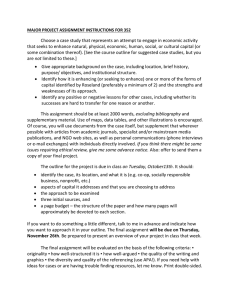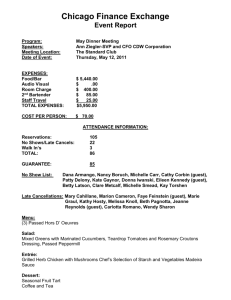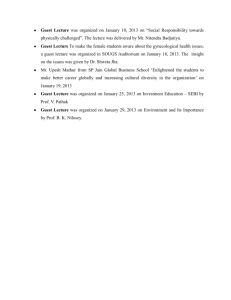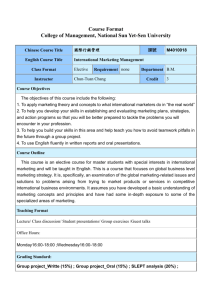The University of North Carolina at Chapel Hill Course Number:
advertisement
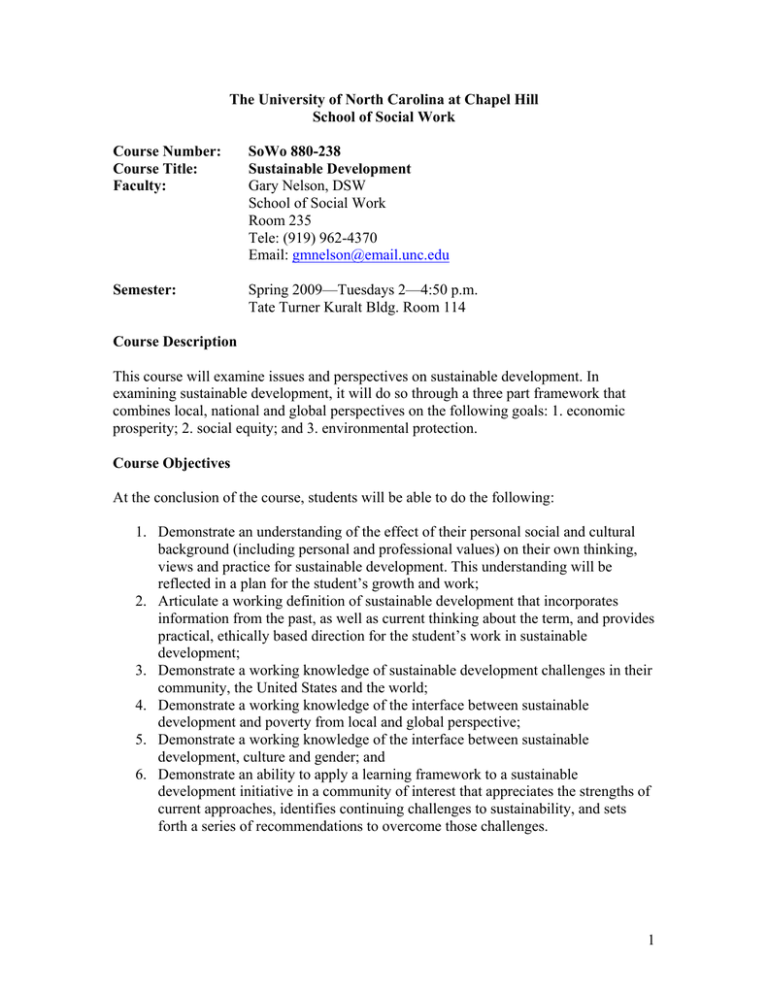
The University of North Carolina at Chapel Hill School of Social Work Course Number: Course Title: Faculty: SoWo 880-238 Sustainable Development Gary Nelson, DSW School of Social Work Room 235 Tele: (919) 962-4370 Email: gmnelson@email.unc.edu Semester: Spring 2009—Tuesdays 2—4:50 p.m. Tate Turner Kuralt Bldg. Room 114 Course Description This course will examine issues and perspectives on sustainable development. In examining sustainable development, it will do so through a three part framework that combines local, national and global perspectives on the following goals: 1. economic prosperity; 2. social equity; and 3. environmental protection. Course Objectives At the conclusion of the course, students will be able to do the following: 1. Demonstrate an understanding of the effect of their personal social and cultural background (including personal and professional values) on their own thinking, views and practice for sustainable development. This understanding will be reflected in a plan for the student’s growth and work; 2. Articulate a working definition of sustainable development that incorporates information from the past, as well as current thinking about the term, and provides practical, ethically based direction for the student’s work in sustainable development; 3. Demonstrate a working knowledge of sustainable development challenges in their community, the United States and the world; 4. Demonstrate a working knowledge of the interface between sustainable development and poverty from local and global perspective; 5. Demonstrate a working knowledge of the interface between sustainable development, culture and gender; and 6. Demonstrate an ability to apply a learning framework to a sustainable development initiative in a community of interest that appreciates the strengths of current approaches, identifies continuing challenges to sustainability, and sets forth a series of recommendations to overcome those challenges. 1 Required Texts and Readings 1. Esty, Daniel C. and Andrew S. Winston. (2006). Green to Gold. New Haven, Ct., Yale University Press. 2. Senge, Peter et. al. (2008). The Necessary Revolution: How Individuals and Organizations Are Working Together to Create a Sustainable World. New York, Doubleday. 3. Roseland, Mark (2005). Toward Sustainable Communities. Gabriola Island, BC: New Society Publishers. 4. Additional readings will be identified and assigned throughout the semester in conjunction with the course topics, lectures, and guests. Recommended Readings 1. Ellerman, David. (2006). Helping People Help Themselves. Ann Arbor, MI: the University of Michigan Press. 2. Flyvbjerg, Brent. (2001). Making Social Science Matter. New York: Cambridge University Press. 3. Friedman, Thomas L. (2005). The World is Flat: A Brief History of the 21st Century. New York: Farrar, Straus, and Giroux. 4. Gill, Indermit S. and Todd Pugatch (2005). At the Frontiers of Development. Washington, DC: World Bank. 5. Goleman, Daniel. (2006). Social Intelligence: The New Science of Human Relationships. New York: Bantam Books. 6. Hart, Maureen (1999). Guidelines to Sustainable Community Indicators. Second Edition. N. Andover, MA: Hart Enviromental Dta. 7. Hawken, P., Lovins, A. and Lovins, L.H. (1999). Natural Capitalism: Creating the Next Industrial Revolution. Boston: Little, Brown and Company. 8. Henderson, Hazel. (1996). Building a Win-Win World: Life Beyond Global Economic Warfare. San Francisco, CA: Berrett-Koehler Publishers. 9. United Nations Development Program (UNDP) (2004). Human Development Report 2004. New York: Oxford University Press. 10. Wheatley, Margaret (1992). Leadership and the New Sciences: Learning About Organization from an Orderly Universe. San Francisco, CA: Berrett-Koehler Publishers. 2 Course Calendar---Organizational Modules, Readings and Assignments Module I: Getting Started and Framing the Issue in Sustainable Development Session 1: January 13h—Introduction—Waves of Change—Necessary Revolution Long Wave of Change—Necessary Revolution in Sustainable Development Theory of Change Communities of Practice—Green Plus Guest Speaker: Carlos Garcia—Thinking About Development Class Exercise—Small Group Exercise Knowledge assessment and course expectations. Exploring the relationship between sustainable development and issues of environmental protection, economic development, and social equity. Assignments—Next Class Session Develop your own definitions of sustainable development as it pertains to your career goals—two pages double spaced. Write me letter—Over the next two weeks you must write me a letter dated April 21st, which begins with the words, “Dear Mr. Nelson, I got my __ (grade) because….,” and in this letter you are to tell, in as much detail as you can, the story of what will have happened to you by this date that is in line with the grade you have earned.” In writing this letter everything must be written in the past tense. I am interested in knowledge and skills you will have gained but also the person you have become, e.g. your philosophy and stance toward social and economic development. 3 Session 2: January 20th –Framing the Issues of Sustainable Development Assigned Reading: Senge, Peter et al. (2008). “Part I: Endings and New Beginnings.” Pg. 3-42. Recommended Reading: Roseland, Mark (2005). “Part I: Sustainable Community, Sustainable Planet.” Pg. 1-39. Guest: Aaron Nelson and Chamber Team—The Foundation for a Sustainable Community and the Institute for Sustainable Development History of the Foundation and Institute Vision and Business Plan Developing a Work Plan for the Semester Session 3: January 27th —Green Plus as a Community of Practice for Sustainable Development Start-Up Assigned Reading: Esty, Daniel C. and Andrew S. Winston. (2006). “Part 1: Preparing for a New World.” Pg. 7-65. Module II: Green Plus—People, Planet, and Profit Session 4: February 3rd –Overview of Sustainable Development Assigned Reading: Guest: Frank Phoenix—Fenwick Foundation and Greenbridge Thinking Together (4)—Community Engagement for Sustainable Development 4 Session 5: February 10th – People Assigned Reading: Senge, Peter et. al. (2008). “Part II: The Future Is Now.” Pg. 57-77. Recommended Reading: Roseland, Mark. (2005). “Chapter 11 Housing and Community Development and Chapter 12 Community and Economic Development.” Pg. 154-184. Guest: Self-Help Credit Union Session 6: February 17th — Planet Assigned Reading: Esty, Daniel C. and Andrew S. Winston. (2006). “Part II: Strategies for Building Eco-Advantage.” Pg. 101—142. Recommended Reading: Roseland, Mark. (2005). “Chapter 4-Greening the City (pgs. 44-56); Chapter 8 Atmospheric Change and Air Quality (pgs. 103-111); Chapter 9 Transportation and Traffic Management (114-128); and Chapter 10-Land Use and Urban Form (133-150). Guests: Rural and Urban Sustainable Development Session 7: February 24th ---Profit—Making a Sustainable Profit Assigned Reading: Senge, Peter et. al. (2008). “Part III: Getting Started.” Pg. 101-157. Recommended Reading: Roseland, Mark. (2005). “Chapter 5-Water and Sewage (pgs. 60-71) and Chapter 7-Waste Reduction and Recycling (74-84). Guest: Restaurant 5 Session 8: March 3rd—Metrics for Sustainable Development Assigned Reading: Esty, Daniel C. and Andrew S. Winston. (2006). “Part III: What WaveRiders Do.” Pg. 143-206. Guest: Jonathan Estes Student Presentations: Feedback on the Green Plus Platform Spring Break—March 6th to 16th Module III: Creating a Framework for Sustainable Development Session 9: March 17th Assigned Reading: Senge, Peter et. al. (2008). “Part IV—Seeing Systems.” Pg. 168-196. Recommended Reading: Roseland, Mark. (2005). “Chapter 13—Governing Sustainable Communities.” Pg. 190-196. Guest: Triangle Community Foundation—A Community Perspective Session 10: March 24th— Assigned Reading: Senge, Peter et. al. (2008). “Part V: Collaborating Across Boundaries.” Pg. 227267. Guest: Micro Enterprises and Conservation Fund 6 Session 11: March 31st Assigned Reading: Senge, Peter et. al. (2008). “Part VI: From Problem Solving to Creating.” Pg. 285334. Recommended Reading: Roseland, Mark. (2005). “Chapter 14-Tools for Community Sustainability.” Pg. 207-215. Guest: Energy Session 12: April 7th Assigned Reading Esty, Daniel C. and Andrew S. Winston. (2006). “Chapter 9-Inspiring and EcoAdvantage Culture and Part IV: Putting It All Together.” Pg. 206-283. Guest: Sustainable Development as Community Development Session 13: April 14th Assigned Reading: Senge, Peter et. al. (2008). “Part VII: The Future.” Pg. 348-378. Recommended Reading: Roseland, Mark. (2005). “Chapter 15—Lessons and Challenges.” Pg. 219-222. Flip-It Presentations Session 14: April 21st Assigned Reading: Flip-It Presentations 7 Class Assignments There are three assignments due in this course: 1. Letter—Course Grade: Letter identifying grade earned and content learned: Due on January 20th. 2. Thought Piece: A thought piece on sustainable development—your personal working definition: Due January 20th. 3. Feedback on Green Plus Web Platform: Due on March 3rd. 4. Essays and Presentations: Key Works on Sustainable Development 5. Flip It Exercises and Presentations Assignment of Course Grades The following weights will be applied to the various assignments associated with this course. 1. Thought Piece 10% 2. Feedback on Green Plus 20% 3. Essays/Presentations 20% 4. Flip-It Presentations 40% 5. Class Participation 10% Course Evaluation The course will be evaluated using evaluation form developed by the School of Social Work. 8
